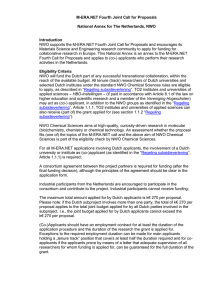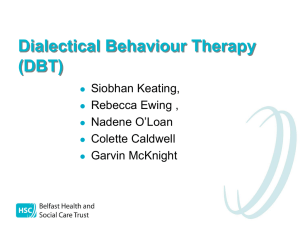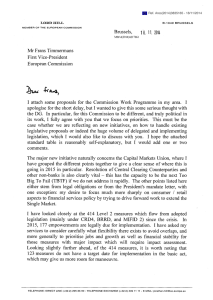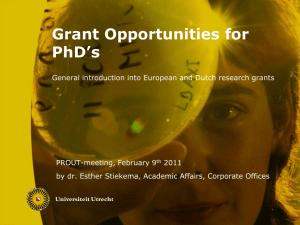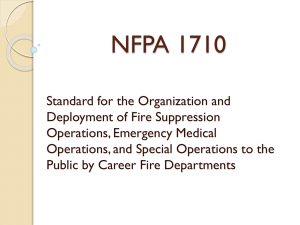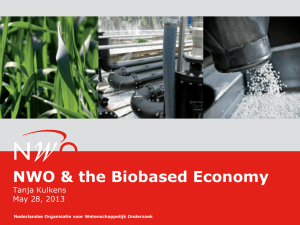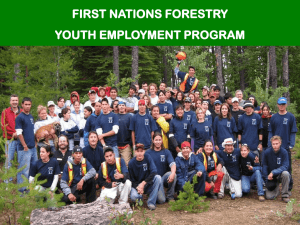improved tolerance to heat and drought | call for proposals
advertisement
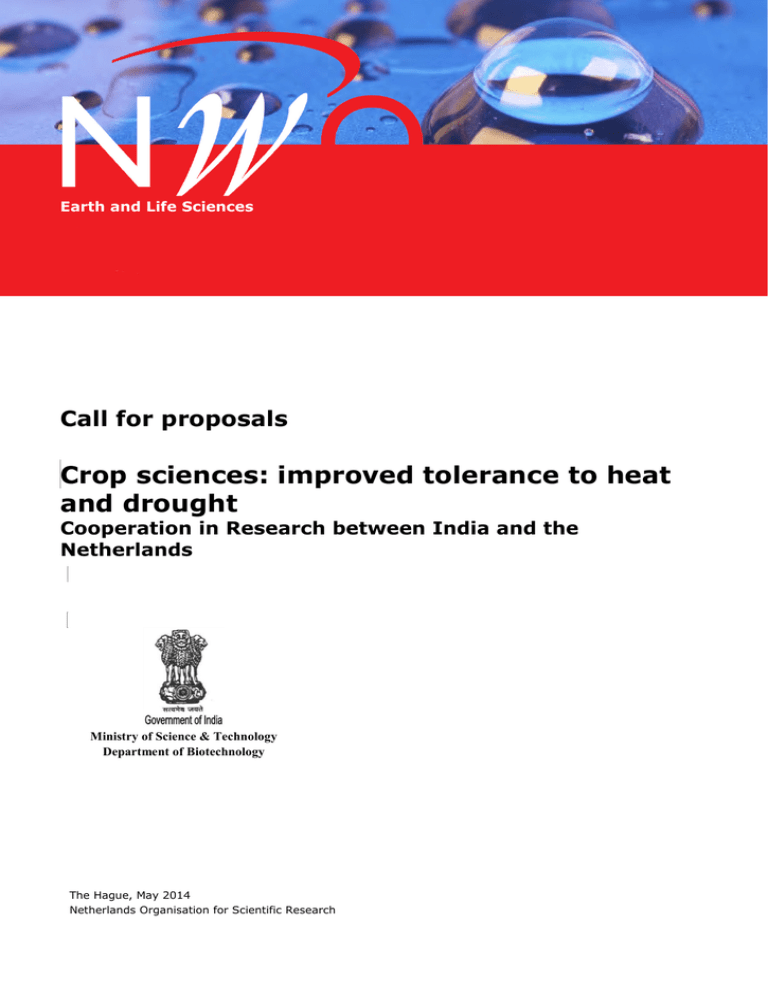
Earth and Life Sciences Call for proposals Crop sciences: improved tolerance to heat and drought Cooperation in Research between India and the Netherlands Ministry of Science & Technology Department of Biotechnology The Hague, May 2014 Netherlands Organisation for Scientific Research Contents 1 Introduction 1 1.1 Background 1 1.2 Available budget 1 1.3 Validity of the call for proposals 1 2.1 Thematic focus: ‘Crop sciences: improved tolerance to heat and drought’ 2 2.2 Organisers encourage knowledge utilisation Guidelines for applicants 3 4 3.1 Who can apply 4 3.2 What can be applied for 5 3.3 When can applications be submitted 6 3.4 Preparing an application 6 3.5 Specific conditions 6 3.6 Submitting an application Assessment procedure 8 4.1 Procedure 8 4.2 Criteria 9 5.1 Contact 10 5.2 Other information 10 2 3 4 5 Aim Contact details and other information 2 6 10 1 Chapter 1: Crop sciences: improved tolerance 1 Introduction 1.1 Background The Department of Science and Technology (DST), Government of India, and the Netherlands Organisation for Scientific Research (NWO) jointly open a call for proposals. The topic of this call is ‘Crop sciences: improved tolerance to heat and drought’. This call will be implemented by the Department of Biotechnology (DBT), Government of India and by the Earth and Life Sciences department (ALW) of NWO. The programme offers funding opportunities for bilateral research co-operation between Dutch and Indian research groups. This call for proposals sets out information about the possibilities for submitting applications, the conditions that applications must meet and the procedure for assessing the applications. 1.2 Available budget The call budget covers funding for maximum three joint bilateral projects, jointly funded by DBT and NWO. A project allows for the application of four PhD/post-doc positions: two in India (duration and fellowship amount as per terms and conditions of DBT) and two in The Netherlands (duration and fellowship amount as per terms and conditions of NWO, including terms contained in this brochure). The Dutch part of the project grants are subject to a maximum of € 466,500 (1.4 M€ for the programme as a whole). The Indian part of the grant would be as per requirements of the project team for items covered in § 3.2. 1.3 Validity of the call for proposals This call for proposals, version1.0, is valid until the closing date Tuesday 2 September 2014. 2 Chapter 2: Crop sciences: improved tolerance 2 Aim Heat, drought and salinisation are a threat to crops. The worldwide need for food is continuously rising. This programme (see the thematic focus presented in paragraph 2.1) wants to contribute to crops that better withstand these forms of abiotic stress. The aim of the call for proposals is to stimulate sustainable Indian-Dutch research collaboration by funding joint research projects on the topic ‘Crop sciences: improved tolerance to heat and drought’. Both countries have a strong history in plant research. This programme will contribute to the further enhancement of bilateral innovative research that is aimed at solutions for challenges we face regarding our current and future society. Projects should contribute and foster the collaboration between the best research institutes/groups in both countries. Collaboration projects should: − aim for solutions by plant research to the benefit of society; − contain highly innovative research; − have a strong interdisciplinary character; − contain high quality scientific research and must be executed by researchers and institutes with very good track records; − be a co-operation between top institutes in both countries and include active − aim at scientific collaboration lasting beyond the duration of the research involvement of at least two complementary institutes/groups in each country; project. 2.1 Thematic focus: ‘Crop sciences: improved tolerance to heat and drought’ Thematic focus In many geographical regions of the world abiotic stresses represent an increasing threat to agriculture. Temperature extremes, drought and the resulting high salt content of soils, represent serious threats to crop species productivity. Effects of drought can be mitigated by irrigation. However, fresh water resources are depleting, and agriculture is the biggest spender of the world’s fresh water reserves. In addition, irrigation often impacts soil quality, increasing salinity in arable lands. In other words: the solution has to come through better adapted plant varieties. The response of plants to drought and heat stress is complex, involving physiological, structural, morphological and biochemical changes that interact with other environmental factors and metabolic processes. Consequently, improving crops for tolerance to these stresses is not straightforward. On the one hand, gaining knowledge about the factors that control water use, temperature, photosynthesis and transpiration/assimilation, osmotic adjustment, leaf damage and leaf senescence, and partitioning of carbon in plants exposed to these stresses, is essential. On the other hand, the spillover of drought stress-induced effects on other processes, like nutrient acquisition and biological stress factors like susceptibility to pests and diseases, must be considered. Breeding programmes for new varieties that perform well under drought and heat stress are characterized by a rather broad focus. Topic relevance As world population expands, crop production will have to be tailored to sustain food security and it has been suggested that world food production will have to increase by 70% to meet the demand of a population exceeding 9 billion by 2050. The relative rates of yield increase for the major crops are declining and there is a surging demand for food from emerging economies such as India. By 2050, the decline in calorie availability will aggravate 3 Chapter 2: Crop sciences: improved tolerance malnutrition in children by 20%, emphasising the extreme challenge plant breeders and farmers are facing. Perspective for long-term co-operation The programme is based on previous discussions between Indian and Dutch ministries, which has resulted in a focus on abiotic plant stress. It provides opportunities to bring together researchers from the Netherlands and India to engage in projects that can develop into long-term co-operation beyond the funding period of this programme. 2.2 Organisers encourage knowledge utilisation The subject of this joint research programme is very relevant to society. For this reason, all grant applicants have to elucidate the potential utilisation of knowledge resulting from their proposed research. This information will be taken into account when assessing their proposals. Within the context of this programme, knowledge utilisation is defined as follows: ‘a process that promotes the use of the outcomes of scientific research both outside academia and by other academic disciplines. This process frequently requires interaction between the researcher and the potential knowledge user and such interaction may occur at any stage of the research, from the formulation of the research question right through to the dissemination of the results’. The organisers of this programme jointly encourage researchers to achieve wider knowledge utilisation by asking them to reflect in advance on the potential for it and to develop concrete action plans in this respect. 4 Chapter 3: Crop sciences: improved tolerance 3 Guidelines for applicants 3.1 Who can apply Indian principal investigators acting as (co)-applicants should be affiliated with a public funded academic or research organisation in India besides meeting other criteria that may be set by DBT. With regard to Dutch (co)-applicants the following criteria must be met: a - Researchers from the following knowledge institutions can submit proposals: − Dutch universities; − NWO and KNAW institutes; − the Netherlands Cancer Institute; − The biodiversity centre NCB Naturalis − the Max Planck Institute for Psycholinguistics in Nijmegen; − researchers from the DUBBLE Beamline at the ESRF in Grenoble. b - Researchers from the following knowledge institutions can submit a proposal provided that the institution cooperates with a university in the project for which a grant is being applied for, apparent from a contribution to the project by the university in terms of personnel or material: − Royal Netherlands Meteorological Institute; − UNESCO-IHE Institute for Water Education. c - Other Dutch knowledge institutions in the field of Earth or Life Sciences can submit a request to the ALW board to be admitted to this programme. Please refer to the 'NWO Regulation on Granting' for this. The Earth and Life Sciences board may impose additional conditions on the embedding of the research, in a financial, logistical, or substantial sense. Only after admission can applications be submitted. d - Applicants must hold a doctorate and/or be professor. e - Applicants must have a paid appointment for at least the duration of the application process and the research for which the grant is requested. f - Applicants with a temporary position which ends during the period of the application process or the research period of the proposed project, can only apply in case the employer states that it will guarantee the position of the applicant for the research period of the project. The form for this statement can be requested via alwindiacropstress@nwo.nl. g - Employees who have a ‘zero-hours’ contract (‘0-aanstelling’) or a contract as an unpaid guest researcher cannot apply. h - Applicants may not apply for a position for themselves. i – Applicants may be involved in a maximum of two applications within this programme. They may act as main (Dutch) applicant in not more than one proposal. j - When applying for a PhD student (AIO), the research group must have a promotor. The promotor does not need to be the applicant. 5 Chapter 3: Crop sciences: improved tolerance k - Eligible research teams are composed of Dutch and Indian researchers, with active involvement in the project of a senior Principal Investigator on both the Indian and the Dutch side. As the programme is aimed at scientific collaboration between institutes, in each country at least two groups or institutes with complementary expertise should be involved. 3.2 What can be applied for Under this joint Indian-Dutch programme a financial contribution in the cost for personnel and some categories of material costs can be requested from DBT (India) and NWO (Netherlands) for the purposes of a joint Indian-Dutch research project. Financial support for the purposes of the approved projects can cover: 1. Either 2 or 4 temporal positions (For the Netherlands PhD-positions and/or postdoc-positions only; for India: NET-qualified PhD-students (junior research fellowships) or post-doctoral (Research associate) positions only), equally divided over eligible institutions in India and the Netherlands. In the case of 2 temporal positions each in both countries, the positions in the Netherlands may consist of either: - 1 PhD-position (48 months) in combination with 1 postdoc-position (24 months), both to be completed during the project’s 48 months lifetime; - 2 postdoc-positions with a combined duration of (no more than) 60 months and each position not longer than, and completed within, the project’s maximum duration, in this case 36 months. For the duration and fellowship amounts in India, DBT rules apply. DBT works with fellowship rates as announced by DBT. DBT grants can only be applied for NET qualified PhD students (Junior Research Fellowship) and post-doctoral (Research Associate) positions. In addition, also House Rent Allowance and Medical budget, as per host institute norms, can be included. In The Netherlands, personnel costs are subsidised in accordance with the most recent “Agreement on Employers’ responsibilities NWO - VSNU‟ (’Akkoord bekostiging wetenschappelijk onderzoek 2008’: http://www.nwo.nl/documents/nwo/salaristabellen/akkoord-bekostigingwetenschappelijk-onderzoek-2008) with annually updated ‘vergoedingentabel’. 2. Obligatory exchange visits for scientists in the research team with a temporary position for the duration of the project. Each postdoc or PhD-student has to visit, and be involved in lab research at, a counterpart in the partner-country at least once during the project, for a maximum period of 3 months. Annual project meetings, obligatory from the second year onwards, to enhance the exchange of ideas, experiences, knowledge and skills between the research teams. 3. Minor equipment, consumables and/or accessories. For a PhD (48 months) or a 36 months-postdoc the maximum materials budget amounts to € 50,000. For postdocs the material budget varies with the length of their contract (e.g. employing a postdoc during 24 months corresponds to a maximum materials budget of € 33,333). Indian budget will cover costs towards equipment, consumables, contingency, travel, overheads and the manpower employed under the project as per DBT norms. On the Dutch side a maximum budget of € 466,500 per project can be applied for. DBT will provide matching funds to the Indian scientists. 6 Chapter 3: Crop sciences: improved tolerance 3.3 When can applications be submitted The closing date for the submission of proposals is Tuesday 2 September 2014, 11.00 UTC (corresponds to 13.00 hrs local summer time in the Netherlands and 16.30 hrs India Standard Time). Additions or changes after this deadline are not possible. You have the right to withdraw your proposal. Applications received after the deadline will not be considered. 3.4 Preparing an application Research teams submit one single joint Indian-Dutch research proposal (see item 3.6) to NWO before the deadline. Besides, they submit a soft copy (the electronic version) of their joint application to DBT, using the following email address: shailja.dbt@nic.in). In addition, 4 hard copies printed on paper have to be sent to DBT through proper channel to the following address: Dr. Shailja V. Gupta Director International Collaboration Department of Biotechnology Block-2, 6-8th Floors, CGO Complex Lodi Road, New Delhi – 110 003. Please note that (except for one of the ‘summaries for the general public’) all applications and fact sheets to be submitted to NWO are to be written in the English language. 3.5 Specific conditions For Dutch researchers, this ‘Call for Proposals’ is subject to NWO’s general terms and conditions (‘NWO regulation on granting’, to be found at: http://www.nwo.nl/en/documents/nwo/legal/nwo-regulation-on-granting-may2011). For Dutch researchers the instructions and regulations of the Earth and life sciences department apply as well (to be found at: http://www.nwo.nl/documents/alw/formulieren/alw-aanwijzingen-en-regelingpersoneelsinformatieformulier-pif). For Indian researchers, General & Financial Rules (GFR) for the grants given by Government of India would be applicable. Additionally, publications resulting from the research project should be jointly published by the researchers from India and The Netherlands, acknowledging the financial contributions from both organisations. 3.6 Submitting an application A research grant application consists of two parts: • a fact sheet (that opens upon addressing the IRIS electronic application submission system of NWO) containing the key details of both applicant(s) and application, and • a filled out version of the special application form “Crop sciences: improved tolerance to heat and drought” (that can be downloaded through the NWO website). 7 Chapter 3: Crop sciences: improved tolerance Requirements presented in this programme document, as well as instructions included in either the fact sheet or special application form (for instance on text length and layout), must be observed. Only the filled out fact sheet, with the pdf-version of the filled out special application form as its only attachment, both filled out using the English language, except where indicated otherwise, should be submitted before the deadline to NWO through the IRIS-account of the Dutch principal investigator exclusively. Other forms or formats will not take part in the evaluation procedure. It is not allowed to include other documents or attachments (like letters of support). It is also not allowed to send the proposal to NWO by other means than through NWO’s electronic application system IRIS, or by using someone else’s IRIS-account. or other form formats. The operating procedure and instruction manual for Iris can be found at http://www.iris.nwo.nl. If the main applicant does not have an Iris account yet, he or she is advised to create one at least several days before the submission deadline. In the event of registration problems, the applicant stands a better chance of them being solved in time for submitting. For technical questions, please contact the Iris helpdesk (see 5.1.2). ─ An application consists of two parts: a factsheet containing the key details of both the applicant and the application, and the research proposal itself, both written in the English language. In order to be eligible, the research proposal must be submitted as a pdf-attachment version of a completely filled out application form “Crop sciences: improved tolerance to heat and drought”; ─ You complete the fact sheet directly in NWO’s electronic application system. When filling out the factsheet you should only use ASCII characters (“plain text”). The use of formula’s, italics, et cetera, on the factsheet is not possible, since it will result in distorted text. The factsheet is completed and submitted electronically using Iris. One of the parts of the factsheet is a summary of maximally 300 words, which preferably is the same as the English scientific summary in the proposal (please note that one of the summaries for the general public is to be written in Dutch); ─ When you electronically submit this factsheet, you also submit the proposal as an attachment in pdf-format. Within this pdf-version of the proposal itself you can use non-ASCII-characters, formula’s, italics, graphs, images et cetera. ─ Research teams submit one single joint Indian--Dutch research proposal. The proposal must be submitted electronically by the Dutch main applicant, using the IRIS-account of the Dutch main applicant, to NWO (see § 3.6). Please see section 3.4 for details on how to submit obligatory soft- and hard copies of your application to DBT in India. 8 Chapter 4: Crop sciences: improved tolerance 4 Assessment procedure 4.1 Procedure Research teams submit one single joint Indian-Dutch research proposal. NWO collects the digital proposals and forwards electronic copies of the proposals to DBT, the Indian Department of Biotechnology. The joint assessment procedure includes (1) eligibility check, (2) peer review (3) scoring and ranking by a joint assessment committee of independent scientific experts (4) funding decision by the Indian-Dutch Joint Committee. Step 1: Eligibility of Joint Research Projects The first step in the assessment procedure is to determine the admissibility of the application. This is done using the conditions stated in Chapter 3 of this call for proposals. The eligibility of the proposals is checked by both NWO and DBT. Eligible proposals enter the assessment procedure. Applicants of non-eligible proposals will be offered one opportunity to amend their application. Only if proposals meet the eligibility criteria within the amendment period offered, such proposals can enter the assessment procedure. Step 2: Peer Review The quality of the proposals will be assessed by independent scientific experts (‘referees’), according to the criteria specified (see § 4.2). Each proposal is sent to preferably four, but no less than two independent, scientific experts, who will review the proposal. The anonymously written reviews collected by NWO are sent to the Dutch Principal Investigator. The research teams are given the opportunity to provide a written reply to the review reports (‘rebuttal’) to the comments of the referees. This reply may not exceed two pages. Step 3: Assessment Committee The English language version of the proposal, the referee reports and the applicants’ response are sent to the joint assessment committee. The assessment committee comprises independent scientific experts, of any nationality, selected by NWO and DBT. The assessment committee convenes once to moderate, rank and recommend proposals for funding on the basis of the criteria specified in § 4.2. The assessment committee’s advice is sent to the boards of DBT and NWO-ALW. Step 4: Decision The Indian board responsible for DBT grants, and the board of NWO-ALW take a ‘conditional decision’ on the advice of the assessment committee. After both boards have reached the same ‘conditional decision’, the joint decision becomes effective. Step 5: Informing applicants/implementation Applicants are informed by their national boards. Applicants involved in granted proposals will receive granting letters from their national board, in accordance with national rules and regulations. The NWO Code of Conduct on Conflicts of Interest applies to all persons and NWO staff involved in the assessment and/or decision-making process. 9 Chapter 4: Crop sciences: improved tolerance Timetable June 2014 The opening of the call for proposals is announced on websites of both partners 2 September 2014 Deadline for the submission of joint proposals to NWO (by the Dutch Principal Investigators) 8-15 September 2014 Eligibility check October-November 2014 Consulting of referees November- December 2014 Obtaining joint rebuttals through Dutch applicants (2 weeks to give a response) January 2015 Meeting of the assessment committee, drawing up a ranking for the 2 boards February 2015 Funding advice sent by 2 boards each to their respective funding boards 4.2 March 2015 Joint decision by 2 funding boards April 2015 Start joint research projects Criteria The following assessment criteria apply: − Relevance to the theme of the call and knowledge utilisation The first half of this criterion reflects the extent to which proposals fit within the thematic focus, contribute to the overall aim, see § 2.1; Knowledge utilisation is emphasised to encourage proposals being tailored towards promising solutions to the benefit of the future society. From the applicants’ answers regarding item 7 of the application form, the NWO programme office derives a score for ‘knowledge utilisation’ (in accordance with the method employed by the 2014 edition of NWO-ALW’s ‘Open Programme’) This knowledge utilisation score contributes half of the overall score of the first assessment criterion. − Scientific quality and innovative character of the research proposal The score on this criterion reflects how challenging the content of the proposals is. Is the topic original, does it include innovative elements? Does the project have the potential to make an important contribution to the advancement of science and/or technology? Does it make full use of the interdisciplinarity resulting from more than one group addressing the same challenge? How suitable are the proposed methods and approaches? Does the time schedule seem feasible? If the final aim proves not within reach, e.g. if ‘plan A’ fails, are there milestones to secure progress and to serve as stepping stones to realise goals later or through an alternative approach (‘plan B’)? − Quality of the research groups and co-operation between the groups Are these the researchers, research groups, most likely to realise the ambitious goals? Do they have impressive personal track records, is the reputation of the knowledge institutions such, that they these can be expected to provide support, inspiration and continuity for such an important endeavour? How is the fit between the partners, and do they intend to intertwine their results rather than work independently alongside each other. Can we expect added value from Indian-Dutch cooperation and from the complementary expertise of the national and bilateral research teams? How are the prospects for scientific collaboration lasting beyond the duration of the research project? 10 Chapter 5: Crop sciences: improved tolerance 5 Contact details and other information 5.1 Contact 5.1.1 Specific questions For specific questions about this call for proposals please contact: The Netherlands NWO Mr Theo Saat +31 70 3440791 alwindiacropstress@nwo.nl Mr Berry Bonenkamp +31 70 3494416 alwindiacropstress@nwo.nl India DBT Dr Shailja V. Gupta, Director International Collaboration, Department of Biotechnology, Block-2, 6-8th Floors, CGO Complex Lodi Road, New Delhi – 110 003. Email: shailja.dbt@nic.in Sanjay Kalia, Scientist ‘C’, International Collaboration, Department of Biotechnology, Block-2, 6-8th Floors, CGO Complex Lodi Road, New Delhi – 110 003. Email: sanjay.kalia@nic.in 5.1.2 Technical questions about the electronic application system Iris For technical questions about the use of Iris please contact the Iris helpdesk. Please read the Iris manual before consulting the helpdesk (see http://www.iris.nwo.nl). The Iris helpdesk is available from Monday to Friday from 11.00 to 17.00 hours (local Dutch time) on +31 900 696 4747. Unfortunately not all foreign phone companies allow you to phone to a 0900 number in The Netherlands. You can also send your question by e-mail to iris@nwo.nl. 5.2 Other information Additional information can be found in the application form applicants are obliged to use for submitting their applications. Published by: Netherlands Organisation for Scientific Research Visitor’s address: Laan van Nieuw Oost-Indië 300 2593 CE The Hague mei 2014
